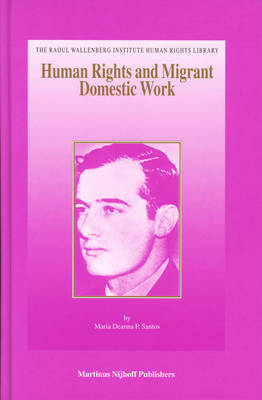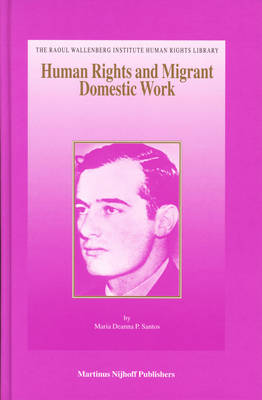
- Afhalen na 1 uur in een winkel met voorraad
- Gratis thuislevering in België vanaf € 30
- Ruim aanbod met 7 miljoen producten
- Afhalen na 1 uur in een winkel met voorraad
- Gratis thuislevering in België vanaf € 30
- Ruim aanbod met 7 miljoen producten
Zoeken
Human Rights and Migrant Domestic Work
A Comparative Analysis of the Socio-Legal Status of Filipina Migrant Domestic Workers in Canada and Hong Kong
Maria Deanna P Santos
€ 445,95
+ 891 punten
Omschrijving
On a general level, this research project concerns ways in which the domestic and international laws relating to the situation of migrant domestic workers (MDWs) are shaped by broader socio-political and economic factors. More specifically, this dissertation examines the human rights situation of Filipina MDWs who participate in Canada's Live-in Caregiver Program (LCP). It attempts to meet these objectives, in part, by undertaking a limited comparison of the situation of these Filipina MDWs and the Filipina MDWs in Hong Kong. The comparison is meant to further test and validate the arguments and proposals presented in this dissertation regarding the socio-legal status of Filipina MDWs under Canada's LCP. This is done through an analysis of existing data on Filipina MDWs, and a consideration of the ways in which the relevant laws and policies in these two jurisdictions affect, create and/or perpetrate the status quo in this area of social life.
The main explanatory theoretical framework that is deployed is the Third World Approaches to International Law (the TWAIL theory).
The main explanatory theoretical framework that is deployed is the Third World Approaches to International Law (the TWAIL theory).
Specificaties
Betrokkenen
- Auteur(s):
- Uitgeverij:
Inhoud
- Aantal bladzijden:
- 260
- Taal:
- Engels
- Reeks:
- Reeksnummer:
- nr. 24
Eigenschappen
- Productcode (EAN):
- 9789004145276
- Verschijningsdatum:
- 8/07/2005
- Uitvoering:
- Hardcover
- Formaat:
- Genaaid
- Gewicht:
- 606 g

Alleen bij Standaard Boekhandel
+ 891 punten op je klantenkaart van Standaard Boekhandel
Beoordelingen
We publiceren alleen reviews die voldoen aan de voorwaarden voor reviews. Bekijk onze voorwaarden voor reviews.








